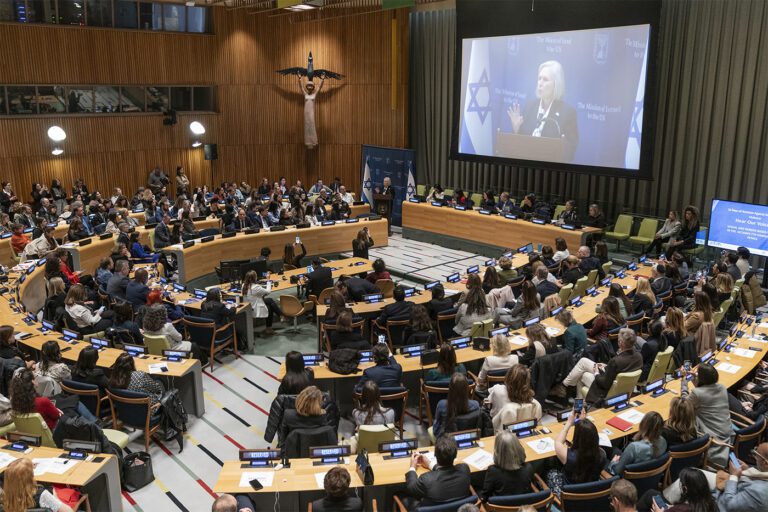A Northeastern University law professor says the political leanings of many women's rights organizations played a role in their silence on the sexual violence perpetuated by Hamas in its Oct. 7 attack on Israel.
“I think organizations here in the US are reluctant to make a statement because a lot of women's rights organizations or feminist-led organizations are aligned with leftist and liberation movements,” she says. Margo Lindauerclinical professor at Northeastern University School of Law.
“Many of these organizations oppose current Israeli policies towards Palestine,” he says.
But when it comes to condemning sexual violence, “my opinion is that it shouldn't matter,” says Lindauer.
“If we stand up for women and stand up to rape as an act of war, we all have to stand up to what Hamas did,” regardless of whether individuals support an Israeli, Palestinian or two-state solution or a ceasefire, she says.
“We need to have this discussion without condemning or agreeing with the war on Gaza,” says Lindauer, who is Jewish and opposes Israeli settlement in the West Bank.
“They are two separate issues,” says Lindauer.
She says it's time for women's rights groups to recognize and take a stand against the sexual violence perpetuated by Hamas.
“If we don't speak up, then we're complicit,” says Lindauer. “The question is why did it take so long for the global community to respond? And why did it take so long for individual women's rights organizations to say anything?'
Delayed or absent responses
Lindauer is not alone in shouting UN Women and other women's rights groups for delayed or absent responses to reports that Hamas was raping and torturing women and other civilians during the offensive. Activists, diplomats and US lawmakers are doing the same.
UN Women, the United Nations agency for women's rights, issued a statement on December 1 — which was 55 days after the attack on kibbutz communities and a music festival — saying he “unequivocally” condemned the “violent attacks by Hamas.”
The agency's statement also expressed concern over “the numerous reports of gender-based atrocities and sexual violence during these attacks.”
The perception of a slow response has angered activists, diplomats and US officials, 89 of which signed a bipartisan letter late last month accusing UN Women of ignoring the brutality of women in Israel.
The National Organization for Women has also been criticized for delaying a statement against the use of rape in war until November 30 and not then mentioning Israel or Hamas.
The delays and silence from women's groups led to an emotional speech by U.S. Sen. Kirsten Gillibrand, D-New York, during a special U.N. session on Dec. 4, led by Israel's Permanent Mission to the U.N.
“When I saw the list of women's rights organizations that said nothing, I almost choked up,” Gillibrand said. “Where is the solidarity for women in this country and in this world to stand up for our mothers, sisters and daughters?”
“The silence is deafening because what a reasonable person could interpret from the silence is that rape against Israeli women is acceptable in war,” says Lindauer.
“If we don't speak out against rape as an act of war in all circumstances, then what we're saying is that it's OK in some cases,” she says.
“Long history of sexual violence”
“There is a long history of sexual violence being used in war and genocide. It is a form or exercise of power and control over citizens and individuals who are victims,” he says Carlos Cuevasprofessor at Northeastern's School of Criminology and Criminal Justice.
“It still happens. There is a long way ahead of us”, he says, despite the creation of a UN resolution in 2009 which requires criminal investigations into conflict-related sexual violence.
“The main issue is the compound trauma that these victims experience,” from being in war or conflict and being sexually assaulted, says Cuevas, a clinical psychologist who counsels victims of sexual assault.
“For me it's more about how much it adds to a traumatic experience,” he says. “The experience of trauma is not only for the victim but for the family members who know it, the people who saw it.”
In its statement on December 1, UN Women said it “actively supports the UN Commission of Inquiry on the Occupied Palestinian Territories, including East Jerusalem and Israel, which launched its inquiry into sexual violence very shortly after the attacks.” .
The agency also referred to the burden of war on Palestinian women and said it reiterated “that all women, Israeli, Palestinian, like all others, are entitled to a life of safety and freedom from violence.”
Cynthia McCormick Hibbert is a reporter for Northeastern Global News. Email her at c.hibbert@northeastern.edu or connect with her on X/Twitter @HibbertCynthia.



